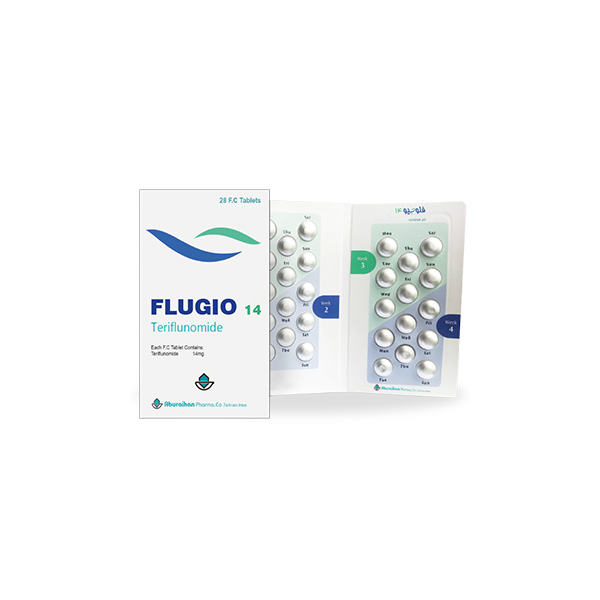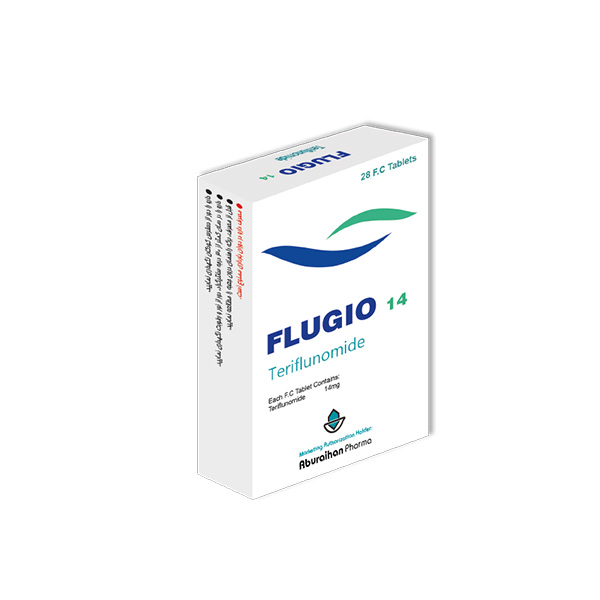Flugio®
Teriflunomide
14 mg Tablet
Treatment of patients with relapsing forms of multiple sclerosis.
Mechanism of Action:
Teriflunomide, an immunomodulatory agent with anti-inflammatory properties, inhibits dihydroorotate dehydrogenase, a mitochondrial enzyme involved in de novo pyrimidine synthesis. The exact mechanism by which teriflunomide exerts its therapeutic effect in multiple sclerosis is unknown but may involve a reduction in the number of activated lymphocytes in CNS.
Method of Administration:
7 mg or 14 mg orally once daily, with or without food
Notes
Contraindications:
Teriflunomide is contraindicated in/with: Patients with severe hepatic impairment, Pregnant women and females of reproductive potential not using effective contraception, Teriflunomide may cause fetal harm, Patients with a history of a hypersensitivity reaction to teriflunomide, leflunomide, or to any of the inactive ingredients in Teriflunomide. Reactions have included anaphylaxis, angioedema, and serious skin reactions, Coadministration with leflunomide.
Interactions:
Drugs metabolized by CYP2C8 and OAT3 transporters: Monitor patients because teriflunomide may increase exposure of these drugs. Teriflunomide may increase exposure of ethinylestradiol and levonorgestrel. Choose an appropriate oral contraceptive. Drugs metabolized by CYP1A2: Monitor patients because teriflunomide may decrease exposure of these drugs. Warfarin: Monitor INR as teriflunomide may decrease INR. Drugs metabolized by BCRP and OATP1B1/B3 transporters: Monitor patients because teriflunomide may increase exposure of these drugs, Rosuvastatin: The dose of rosuvastatin should not exceed 10 mg once daily in patients taking Teriflunomide.
Pregnancy and Lactation:
PREGNANCY: Teriflunomide is contraindicated for use in pregnant women.
LACTATION: There are no data on the presence of teriflunomide in human milk, the effects on the breastfed infant, or the effects on milk production. Because of the potential for adverse reactions in a breastfed infant from teriflunomide, women should not breastfeed during treatment with teriflunomide.
Warning and Precaution:
Teriflunomide may decrease WBC. A recent CBC should be available before starting teriflunomide. Monitor for signs and symptoms of infection. Consider suspending treatment with teriflunomide in case of serious infection. Do not start teriflunomide in patients with active infections. Stop teriflunomide if patient has anaphylaxis, angioedema, Stevens-Johnson syndrome, toxic epidermal necrolysis; initiate rapid elimination. If patient develops symptoms consistent with peripheral neuropathy, evaluate patient and consider discontinuing the medicine. teriflunomide may increase blood pressure. Measure blood pressure at treatment initiation and monitor blood pressure during treatment.
Adverse Reactions:
Most common adverse reactions (≥10% and ≥2% greater than placebo): headache, diarrhea, nausea, alopecia, increase in ALT.
Storage:
Store below 30 and protect from light and moisture.


